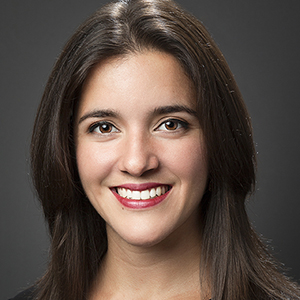Resident Spotlight: Dr. Diana Cuckovic
 There was a time where Dr. Diana Cuckovic, PGY2, Family Medicine, considered dance might be her calling, but her interest for life sciences and desire to help others encouraged her to pursue a different path.
There was a time where Dr. Diana Cuckovic, PGY2, Family Medicine, considered dance might be her calling, but her interest for life sciences and desire to help others encouraged her to pursue a different path.
After earning her medical degree at Queen’s University, the Chief Resident knew she wanted to return to her hometown for postgraduate training at the Schulich Medicine – Windsor Campus.
“My main goal as a family medicine doctor is to not have to say to a patient ‘I never learned about that, I don’t know how to help you.’ I want to be able to help my patients in many facets of their lives, but also be connected enough to specialists to know when to involve them,” Cuckovic said.
“Schulich Medicine has more elective time than other residency programs, so you get more flexibility to focus on different rotations that are important to you.”
Why did you choose the Windsor Campus for your postgraduate training?
The overall learning culture is very strong in Windsor. I haven’t met a single specialist, family medicine doctor or academic advisor that isn’t 100 per cent in it to see us succeed. Whether it’s learning experiences you need, or time, or exam support — everything is targeted to each resident, their goals and successes. The benefit of a smaller program is that we get treated as individuals, and I haven’t seen that culture everywhere. To have every interaction feel tailored and supportive is so fortunate. A big draw of this program was also that it was in my hometown. Windsor has a wonderful arts background, there are musicals and performances happening all the time. And, most of the time, you also have the border to Detroit where you can enjoy theatre and great sports.
What has been the most rewarding part of residency?
My co-residents.
They’re so incredibly supportive, there isn’t that competition of wanting to be better. Everyone just wants to see each other's goals met. We all have such different goals that it’s fun to support each other and live vicariously through each other in that way. Our Windsor Campus is wonderful about making sure we get together once a month, and usually we get together more than that.
The patients are also wonderful people to meet. As much as I’m learning from the staff and my colleagues, I’m also learning from my patients, as they trust me with their problems and questions.
What are your responsibilities as Chief Resident? How do you approach this role?
I feel empowered to make work better for my co-residents. I’m here to connect all of my colleagues, in whatever way that they need to achieve their goals. If they are looking for a new certification or learning opportunity, how can I get them in contact with the right person to make it happen? When they have concerns about a rotation or an evaluation, I have the opportunity to help them make changes and find the joy in that rotation or that learning experience.
It’s been a lot of legwork, but it’s really rewarding to see the ideas and initiatives my colleagues are excited about coming true for them in a way that still feels like they own it and not like they’re giving me an idea to execute myself.
How do you approach and maintain personal wellness as a resident?
Very often in residency we’re told that in order to be well, you have to have work-life balance. I think that having things outside of work is important, but work is undoubtedly where we spend the vast majority of our time. We can’t jam everything we love into the few hours we’re not doing medicine and expect to feel well. For me, it’s remembering why we do medicine, and using that time outside of work to feel whole enough to truly enjoy work.
My preceptor has been such an excellent example of balancing all aspects of your life with medicine. We all really want to love our jobs and give all of ourselves to medicine, but if you’re burning the candle at both ends, you’re not doing your patients justice. I want to take care of myself and my needs so that when I’m with a patient I’m not distracted or stressed.
What are you passionate about outside of medicine?
I dance weekly and teach a Ukrainian dance group. Just before medical school, I was able to do quite a few of the Royal Academy of Dance and Russian Ballet exams. I remember on one of my exams, I received a comment saying I had ‘a clear love of dance,’ which was the best thing I could have ever achieved through my performance.
Before the pandemic, I was also involved in a musical here in Windsor, which we unfortunately weren’t able to bring to fruition. But learning how to manage my time, how to be confident, even remembering lines — all of these are skills that I can bring into the clinic as well.








